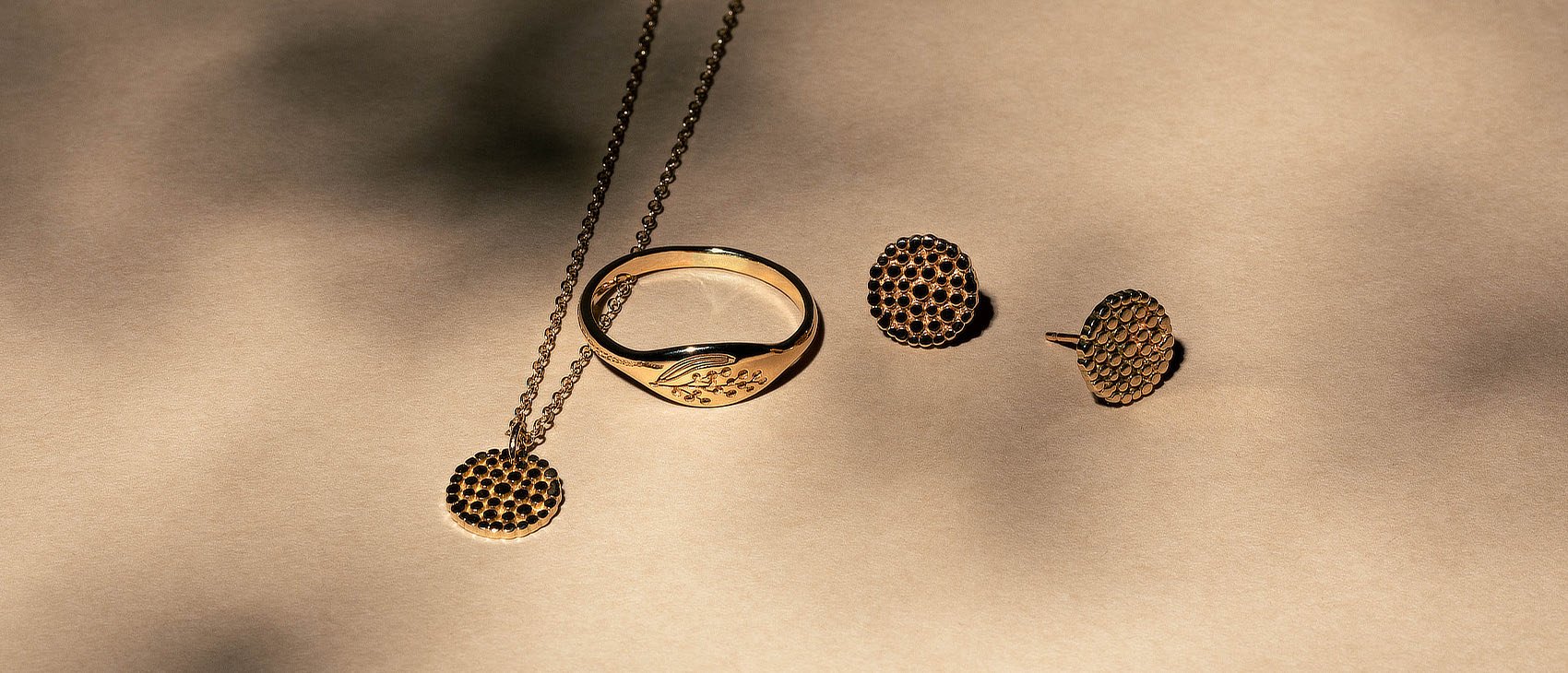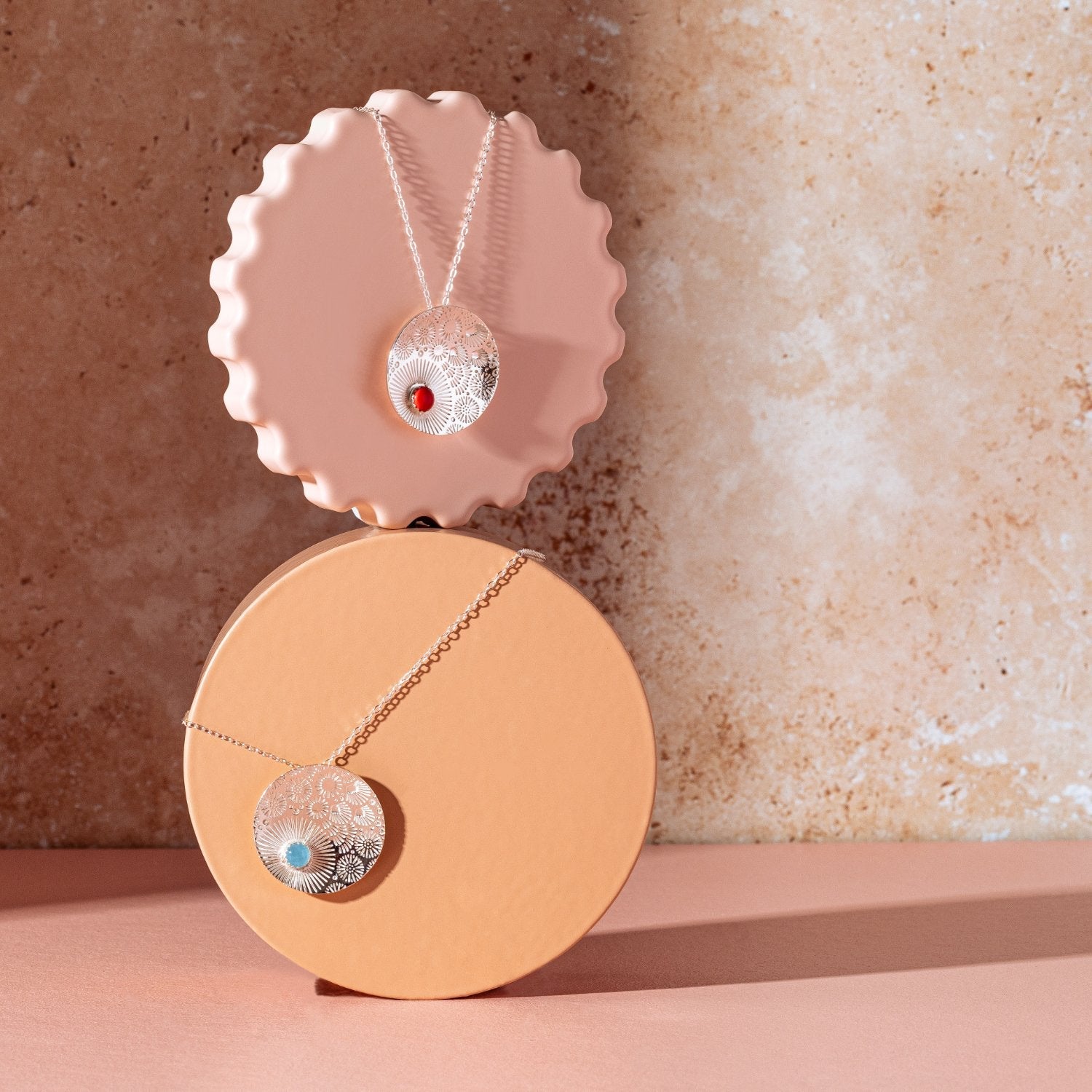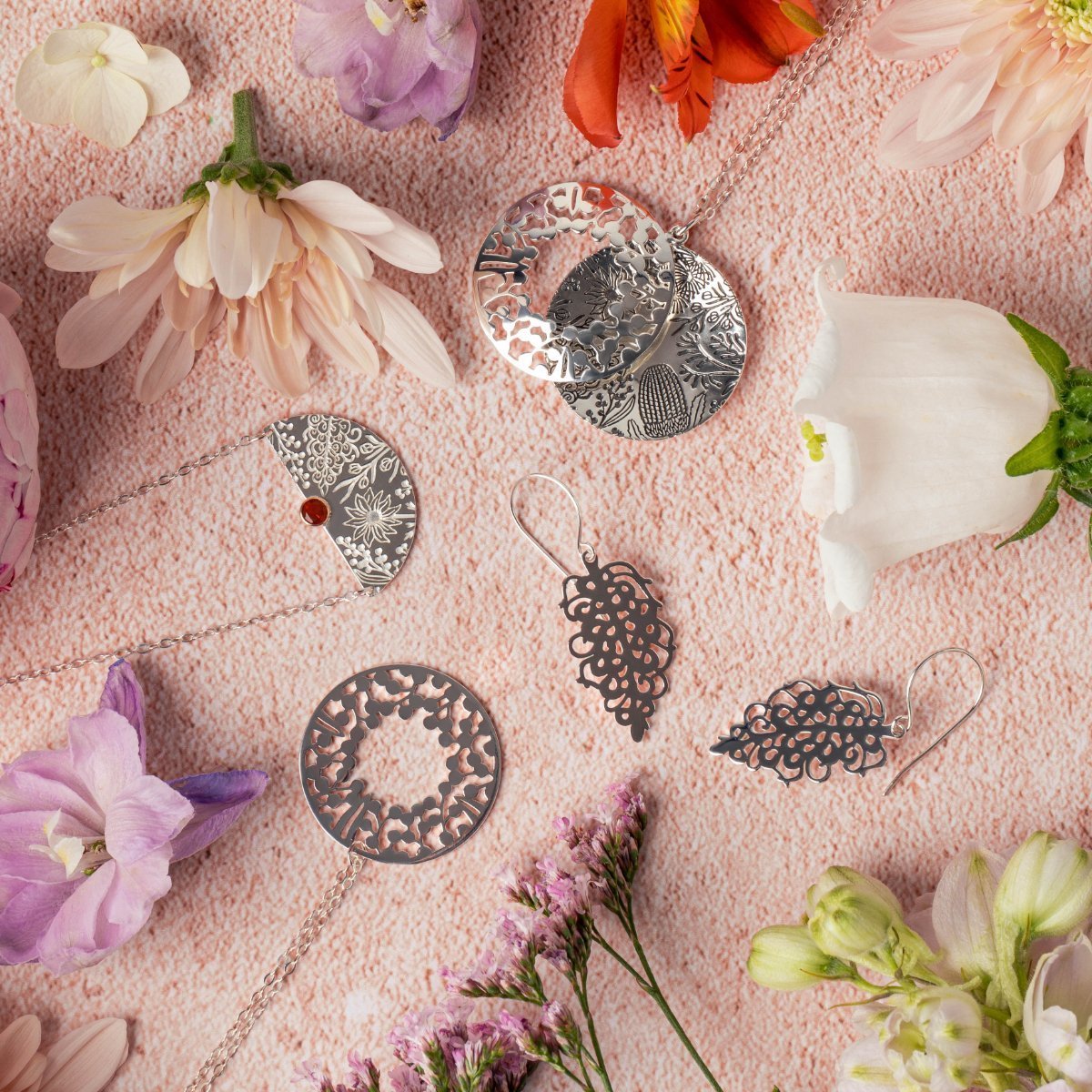 There's something truly magical about opals. With their swirling colours, shifting patterns and otherworldly glow, no two are ever the same - which makes them a perfect match for anyone who wants their jewellery to feel personal and unique. Whether you're drawn to their beauty, curious about their history, or just love wearing beautiful gemstones, opals have a lot to offer.
There's something truly magical about opals. With their swirling colours, shifting patterns and otherworldly glow, no two are ever the same - which makes them a perfect match for anyone who wants their jewellery to feel personal and unique. Whether you're drawn to their beauty, curious about their history, or just love wearing beautiful gemstones, opals have a lot to offer.
As an Australian jewellery designer, I've been creating Opal Jewellery for many years - and I never tire of working with these stunning stones.
Australia is home to some of the world's most beautiful and sought-after opals, and they're always popular in our collections. It's no surprise: opals are eye-catching, full of personality, and endlessly fascinating once you get to know them.
This guide is here to help you do just that. Whether you're shopping for October birthstone jewellery, exploring a new addition to your jewellery box, or simply want to learn more about these captivating gems, I'll walk you through everything you need to know. We'll cover the different types of opals, where they come from, how to care for them, and what to look for when choosing opal jewellery.
So let's get started ...
Why We Love Opals
Opals are unlike any other gemstone. Instead of a single, uniform colour, they shimmer with a kaleidoscope of tones - from fiery reds and glowing oranges to sea greens, blues and purples. This phenomenon is called 'play of colour', and it's what gives precious opals their magical, almost hypnotic appearance.
Each opal is completely one of a kind, thanks to the way these colours form. That makes them a brilliant choice if you love the idea of wearing jewellery that's truly unique - even more so when set in a handmade design.
Opals also have a long history of symbolism. They've been associated with creativity, love, confidence, protection, and even luck. In ancient times they were considered to carry the virtues of all gemstones in one, because of their wide range of colours. Whether you believe in gemstone meanings or not, it's hard not to feel a little enchanted when looking into the depths of a beautiful opal.
And of course, if you're born in October (or buying for someone who is), opal is your traditional birthstone. It's a thoughtful and meaningful gift choice that's as practical as it is beautiful. Check out our Birthstone Jewellery collection.
What Exactly Is an Opal?
Opals are a unique type of gemstone made from tiny spheres of silica that have formed over millions of years, often in cracks or voids in rock.
Unlike most gemstones in jewellery, opals don't have a crystal structure: instead, their beauty comes from the way those silica spheres diffract light. This is what creates the distinctive 'play of colour' that opals are famous for: shimmering flashes of red, blue, green, and gold that shift as you move.
Most natural opals are formed from a slow process involving water carrying silica into rock cavities. Over time the water evaporates, leaving behind the silica deposits that eventually become opal. The result? No two opals are exactly the same - each one is a tiny, unpredictable miracle of nature.
Types of Opals Used in Jewellery
Opals come in a surprisingly wide range of colours and types, well beyond the typical flashes of reds, greens and blues you may be familiar with - and that's part of what makes them so fascinating.
There's a surprising variety of opals, each with its own look, value and personality. Here's a quick rundown of the most common types you might come across when shopping for opal jewellery:
1. Precious Opal
This is the classic opal most people think of: it displays the famous play-of-colour, with flashes of multiple hues that seem to move and shift in the light. Precious opals are the most valuable type and are usually cut as cabochons (a smooth, rounded shape) to show off their colours.
2. White or Light Opal
This variety has a pale or milky base colour, which can range from white to soft grey or cream. The play-of-colour sits on top of this light background, creating a pastel, dreamy effect. It's one of the most common types of Australian opal and can be more affordable than darker varieties.
3. Single Coloured Opals (Without Play-of-Colour)
Not all opals display the famous flashes of colour. Some have a more subtle, single-colour appearance - often in soft whites, creams, pinks, yellows and even blues and greens. These types are still genuine opals, but they lack the iridescent effect of precious opal. They can be a beautiful and unique choice for jewellery, with a gentle, organic quality all of their own. We love using these softer-hued stones in some of our designs for a more understated look.
4. Fire Opal
Fire opals are typically translucent to transparent with a vivid body colour - most often red, orange or yellow. Unlike other precious opals, they may or may not have play-of-colour. The variety we use in our jewellery features a rich, glowing red-orange hue that really stands out. Fire opals are found mainly in Mexico and are prized for their bold, fiery appearance.
5. Black Opal
Black opals are considered the most valuable and rare. They have a dark base tone - not always black, but usually dark grey or blue - which makes the play-of-colour appear especially vivid. Lightning Ridge in New South Wales is famous worldwide for producing high quality black opals.
6. Boulder Opal
Boulder opals are unique to Queensland, Australia. They form in thin seams within ironstone rock and are cut with part of the natural host rock still attached. This makes each one completely distinctive, often with unusual shapes or patterns. The ironstone backing also makes them quite durable.
7. Doublets & Triplets
These are composite stones made from thin slices of precious opal, layered with a backing (doublet) and often a clear protective top layer (triplet). They allow the use of thinner, more fragile pieces of opal that wouldn't be sturdy enough on their own. They're more affordable, but not as durable or valuable as solid opals.
Simulated Opals
Simulated opals are man-made materials designed to mimic the look of natural opals, often using resin, plastic, or glass. They can appear bright and colourful at first glance, but the effect tends to be more artificial or overly uniform compared to the real thing. Unlike other simulated or lab-grown gems (like rubies or sapphires), simulated opals don't come close to capturing the natural complexity or depth of real opals - at least in my opinion!
While simulated opals can be very inexpensive, they don't tend to wear well over time and usually lack the charm and individuality that makes opals so special. For that reason, I choose not to use them in our jewellery designs.
Opals in Australian Jewellery
Opals are deeply woven into the story of Australian jewellery - and with good reason. Australia is the world's biggest producer of opals, responsible for over 90% of the global supply. That means when you're wearing opal jewellery made here, you're often wearing something that's been born from our own landscape - quite literally.
The stone's vibrant, ever-changing colours and natural patterns capture something uniquely Australian: they echo our wide skies, desert sands, and deep ocean blues. It's no wonder opals have long been celebrated in Australian jewellery design, from classic antique styles through to bold contemporary pieces.
In fact, opal was declared Australia's national gemstone back in 1993 - a little nod to just how important and iconic it is in our culture. For many of us, opal jewellery is a way to carry a piece of home wherever we go.
Because of their natural diversity and beauty, opals work brilliantly in both statement pieces and more delicate designs. Whether it's a fiery red-orange stone, a soft pink opal, or a vivid boulder opal with swirling colour, each piece is a little work of art - and no two are ever quite the same.
Symbolism & Meaning of Opals
Opals have long been associated with mystery, magic, and creativity. Thanks to their shifting colours and light-catching beauty, they've been seen as symbols of imagination and inspiration. In ancient times, some believed opals could bring good luck or even contain the power of all gemstones in one, thanks to their rainbow-like colours.
Today, many people see opals as a symbol of self-expression and emotional clarity. They're often chosen to represent inner fire, transformation, and uniqueness - which makes perfect sense, given that no two opals are ever alike.
Opal is also the birthstone for October, making it a popular gift for those celebrating birthdays that month. It's often chosen to mark special occasions, significant transitions, or simply to honour someone who loves beautiful, meaningful jewellery.
Whether you're drawn to opals for their colour, their story, or the way they seem to glow from within, there's something quietly powerful about wearing a gem that feels so alive.
How to Care for Opal Jewellery
Opals are captivating, but they do need a little extra love and care compared to harder gemstones. Whether your jewellery features solid opals or one of the more delicate varieties, here are my top tips for keeping them looking beautiful for years to come:
1. Avoid Sudden Temperature Changes
Opals are sensitive to rapid temperature shifts, which can cause cracking or crazing (a network of fine lines across the surface). Take your jewellery off before moving from a hot environment to a cold one (or vice versa), and don't leave it in direct sunlight or near heating vents for long periods.
2. Keep Opals Away from Harsh Chemicals
Opals don't play well with chemicals, so avoid wearing your pieces when cleaning, swimming in chlorinated water, or applying lotions, perfumes, or hairspray. These substances can dull the stone's appearance or, in the case of doublets/triplets, damage the layered construction. We also recommend you avoid getting your opals wet repeatedly or for lengthy periods.
3. Store Carefully
To avoid scratches or chips, store opal jewellery separately from harder gemstones like diamonds and sapphires. A soft pouch or a lined jewellery box is ideal. If you live in a particularly dry environment, keeping a small damp cloth in your storage container can help maintain a bit of ambient humidity - especially useful for older solid opals that may be more prone to drying out.
5. Wear with Care
Solid opals are more durable than you might think, but they're still not as tough as many other gemstones. To avoid knocks and scratches, it's a good idea to take your opal rings off during heavy-duty tasks like gardening, sports, or DIY projects. Necklaces and earrings are generally less exposed and tend to wear very well. Also we recommend you don't swim, shower or bathe with opal jewellery on - especially repeatedly: opals and water don't get along when they are frequently exposed.
4. Clean Gently
Most opals should be cleaned using mild soapy water and a soft cloth. Avoid ultrasonic cleaners or steamers, as these can cause damage. Also avoid getting opals wet repeatedly or for extended periods. For triplets or doublets, avoid soaking them: a quick wipe-down with a barely damp cloth is safest.
Other Jewellery Articles
Check out our comprehensive guide to How to Clean and Care for Jewellery to learn all you need to know about caring for your jewellery, including softer stones like opals.
(Reading this on a website that isn't simonewalsh.com? Be aware that the content has been stolen, infringing the copyright of a small business. ABN: 65108844126)
Why Choose Opal Jewellery?
Opals are unlike any other gemstone - full of mystery, beauty, and personality. Whether you're drawn to their shifting play of colour or their softer pastel tones, there's something undeniably captivating about wearing a piece of the earth that seems almost alive with light.
They're also a wonderfully meaningful choice. Opals are traditionally associated with creativity, passion, and self-expression - perfect for people who like their jewellery to have a personal or symbolic touch. And if you're celebrating an October birthday, they're the ideal birthstone gift (but let's be honest - you don't need to be born in October to love them).
Best of all, opals have an earthy elegance that feels right at home in Australian jewellery design. Whether you love bold statement pieces or delicate details, there's an opal to suit every style and story.
If you're ready to explore our collection of unique and thoughtfully designed opal jewellery, you'll find something unique to fall in love with.







 Simone Walsh is a
Simone Walsh is a 
